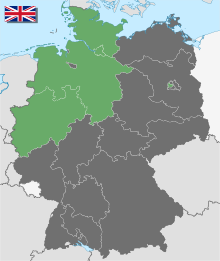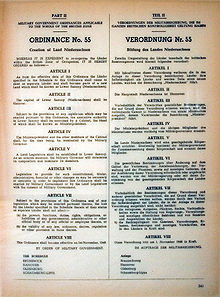British zone of occupation

The British zone of occupation (or northwest zone ) was one of the four zones of occupation into which Germany, west of the Oder-Neisse line , was divided by the victorious Allied powers on the basis of the law of occupation after the surrender in May 1945 .
Occupation area
The British occupation zone included the Prussian provinces of Hanover , Schleswig-Holstein and Westphalia , the north of the Rhine province (" North Rhine ") and the states of Braunschweig , Hamburg , Lippe , Oldenburg and Schaumburg-Lippe of the German Empire when the occupation sovereignty was assumed . The Free Hanseatic City of Bremen , consisting of the cities of Bremen and Bremerhaven, initially also belonged to the British zone, but was added to the American zone of occupation as an exclave in 1947 .
A part of Berlin was also under British occupation due to its four-power status .
Army units from other nations were also stationed within the British occupation zone. B. Polish units in Emsland (until 1948), the Norwegian Germany Brigade west of the Harz Mountains and later in Schleswig-Holstein (1947 to 1953) and Belgian armed forces in North Rhine-Westphalia (until 2002). Another special feature was the Bonn enclave . It was created as an unoccupied area in July 1949 and was under the Allied High Commission .
Political organization
The seat of the military government ( Control Commission for Germany / British Element ) was initially Bad Oeynhausen with further bases in Münster , Düsseldorf , Kiel and Hanover . The plan to move to Hamburg - where the Grindel skyscrapers were built for this purpose from 1946 - was later dropped. The headquarters of the British Rhine Army was also in Bad Oeynhausen, and that of the British Air Force in Germany ( RAF Germany ) in Bad Eilsen until the two headquarters were merged in Rheindahlen in 1954 .

The military government was divided into specialist departments, each of which was subordinate to its own German administrations. A zone advisory council was formed in 1946 to consult with the German authorities in the provinces and federal states , which existed until the Federal Republic of Germany was constituted in 1949.
After the military government constitutionally the country on August 23, 1946 Schleswig-Holstein , Hannover , and " North Rhine / Westphalia " created from the Prussian provinces, Hanover was on November 1, 1946, the countries of Braunschweig , Oldenburg and Schaumburg-Lippe to the country Lower Saxony merged .
On December 31, 1946, the state of Bremen, consisting of the city districts of the Hanseatic City of Bremen and the city district of Wesermünde, emerged from the city and state area of Bremen and the city district of Wesermünde (until then in the state of Lower Saxony).
The state of North Rhine-Westphalia was initially formed from two Prussian provinces, namely the northern part of the Rhine province (" North Rhine ") and Westphalia. In January 1947, the previously independent state of Lippe joined the state of North Rhine-Westphalia. The formation of the countries in the British zone was thus completed. These countries became part of the Bizone on January 1, 1947 , then the Trizone and finally on May 23, 1949, the Federal Republic of Germany .
Military governors
- Sir Bernard Montgomery (1945/46)
- Sir Sholto Douglas (1946/47)
- Sir Brian H. Robertson (1947-1949)
A coordinating function with the British government in London had until April 1947 John Hynd , after him Frank Pakenham .
broadcast
The NWDR was set up in Hamburg as the sole broadcasting station.
See also
- Germany 1945 to 1949
- Zone Advisory Council, a German advisory body for the British Zone (1946-48) formed by order of the military government
literature
- Falk Pinge: “The Russians on the Rhine?” The turn of the British occupation policy in the spring of 1946 In: Quarterly books for contemporary history . Volume 30, 1st issue. January 1982, ISSN 0042-5702 , pp. 98-116 ( ifz-muenchen.de [PDF; 7.5 MB]).
- Werner Plumpe : From the plan to the market. Business administration and employers' associations in the British zone (= Düsseldorfer Schriften zur recent regional history and the history of North Rhine-Westphalia. Volume 22). Schwann, Düsseldorf 1987, ISBN 3-491-33122-6 .
- Volker Koop : Busy. British occupation policy in Germany. be.bra, Berlin 2007, ISBN 978-3-89809-076-6 .
- Michael Ahrens: The British in Hamburg. Occupation life 1945–1958 (= Research Center for Contemporary History in Hamburg [Hrsg.]: Forum Zeitgeschichte. Volume 23). 2., correct. Edition. Dölling and Galitz Verlag, Hamburg 2011, ISBN 978-3-86218-009-7 .
Web links
Individual evidence
- ↑ Ordinance No. 46, Dissolution of the Provinces of the former Land of Prussia in the British Zone and their re-establishment as independent countries (1946). In: verfassungen.de. August 23, 1946, accessed October 7, 2016 .
- ↑ Ordinance No. 55, Education of the State of Lower Saxony. In: niedersachsen.de. November 1, 1946, accessed October 7, 2016 .
- ↑ Ordinance No. 76, State of Bremen. (PDF; 465 kB) In: lwl.org. December 31, 1946, p. 411 f. , accessed October 7, 2016 .
- ^ Proclamation No. 3 of the Military Government of Germany - American Zone (1947). In: verfassungen.de. January 27, 1947, accessed October 7, 2016 .
- ↑ Ordinance No. 77, Land Lippe. (PDF; 465 kB) In: lwl.org. January 21, 1947, p. 411 f. , accessed October 7, 2016 .
- ↑ Mr. Hynd was back . In: Der Spiegel . No. 3 , 1947 ( online - Jan. 8, 1947 ).


